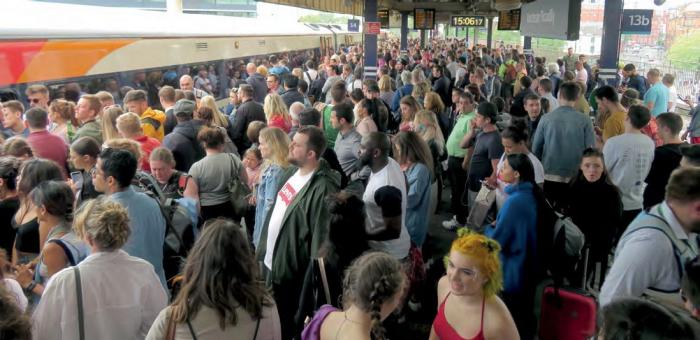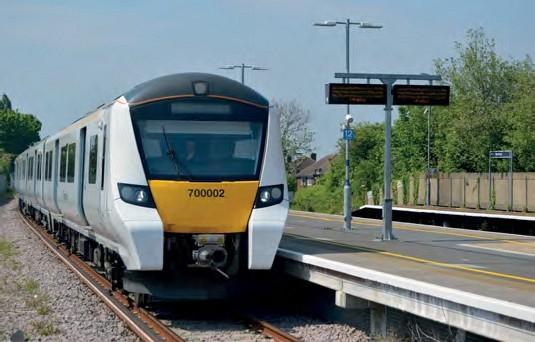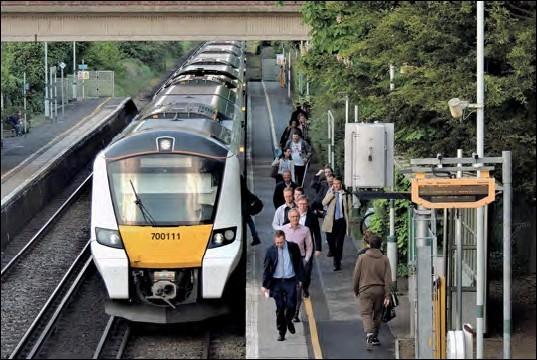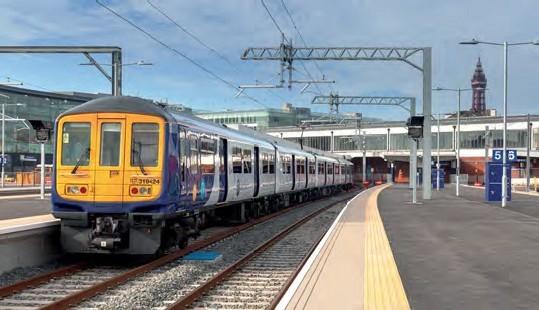Driver route knowledge issues hit GTR and Northern following 20 May changes
News Front


TRANSPORT SECRETARY Chris Grayling has ordered an inquiry into the implementation of new timetables on 20 May, following significant issues at both Govia Thameslink Railway and Northern.
The inquiry will be led by Office of Rail and Road Chair Stephen Glaister and ‘will consider why the system as a whole failed to produce and implement an effective timetable’. Mr Grayling said he will also assess whether GTR and Northern have met their contractual obligations in the planning and delivery of the timetable change. However, the Secretary of State also noted that for Northern a lack of timely delivery of infrastructure upgrades by Network Rail and late finalising of the new GTR timetable by NR were also a major cause of the problems. The Minister said he expected the full May timetable ‘to be introduced in stages over the coming months in order to ensure that it can actually this time be delivered properly’. He also promised compensation for passengers on both GTR and Northern who have been affected by the disruption.
THAMESLINK TOIL
The GTR timetable change formed the first part of the ramp-up of Thameslink services through the core section between St Pancras and Blackfriars. The May change introduced an 18 trains per hour (tph) peak service, with the eventual plan being to run 24tph through the core section. A number of new routes across the capital were due to be introduced, including Peterborough to Horsham, Cambridge to Brighton and Luton to Rainham. Original plans envisaged the ramp-up of services to 24tph happening in two stages (May and December 2018), but a subsequent review by the Thameslink Industry Readiness Board, chaired by Chris Gibb, saw this instead spread over four stages to December 2019 (p52, last month).
Industry sources have told Modern Railways the new Thameslink weekday timetable was not finalised until 4 May, less than three weeks before the change, only then allowing work to conclude on driver diagrams. GTR’s initial timetable bid to Network Rail in 2017 resulted in a timetable offer in November, but with hundreds of services rejected. NR’s Sale of Access Rights Panel subsequently awarded GTR contingent rather than firm rights, which sources have suggested mean GTR services were given lower status in the timetabling process, creating problems with approval and lengthening the ‘bid and offer’ cycle.
This was combined with national issues with agreeing timetables, confirmed by the Rail Delivery Group in February when it was announced the standard 12-week booking horizon would be shortened.
MORE DRIVERS NEEDED
Industry insiders have suggested the final GTR timetable incorporated many compromises from the original plan, meaning 50 more driver diagrams were needed than expected, with this only becoming apparent once the timetable was finally confirmed. Driver rosters were agreed and published on 17 May, just three days before the change, and at this point it was realised additional piloting of drivers would be needed to cover those new routes on which the allocated driver has not been trained.
Extensive piloting arrangements had already been planned, and in some cases the arrangements have required three drivers on a train while route learning takes place. Earlier training of drivers was not possible as driver route knowledge lapses after six months if not used, and until early 2018 it was not clear which drivers needed to know which routes. The connection from the East Coast main line to the Thameslink core through Canal Tunnels came into use on 26 February, which in itself was three months earlier than planned, but with only six trains per day.
In late May GTR introduced a short-term amended timetable for weekday services, while an amended weekend timetable published in early June eliminated running from the ECML through the Thameslink core completely.
On some Thameslink and Great Northern routes where there are extended gaps between trains, additional buses are being provided.
Meanwhile, GTR has continued to work on a revised plan depending on driver availability, while GTR and Network Rail planners have worked on a complete revision of the Thameslink timetable, driver diagrams and rosters, based around driver route knowledge, with extra services to be added as drivers are trained.


NORTHERN HIT IN NORTH WEST
Northern’s timetable change saw a significant percentage of services retimed and some planned enhancements delivered, although many have been deferred due to delayed completion of infrastructure enhancements. Issues with drivers not being trained on the correct types of rolling stock or on new routes saw the operator’s controllers trying to plan services on an almost hourly basis. The impact was most severe in the North West, where some trains ended up stranded partway through a service without a suitably trained driver available. Modern Railways understands the principal cause of the problem was the late request from Network Rail, in its System Operator role, for Northern to withdraw its 20 May timetable and resubmit it with changes less than four months before the start of the new timetable. With crew training and rosters having been planned around the timetable the company had expected to run, and which had been in development for up to a year, there was little time to revise the training programme.
Industry sources report Network Rail Chief Executive Mark Carne was not informed about the request to Northern to withdraw and resubmit its timetable and he only became aware of it once the service began to collapse. Northern was initially further hampered by the lack of a Rest Day Working agreement with ASLEF, which would have allowed services to be restored and training completed more quickly.
Behind the request to change the timetable was the late completion of electrification between Preston and Blackpool North and the continuing delay to the completion of electrification between Manchester and Preston via Bolton. The latter was initially due for completion by December 2016, then delayed until December 2017, further delayed until May 2018 and then delayed again to December 2018.
Industry insiders have suggested May 2019 is now the most likely date for enhanced services to be provided and have called for clarity from Network Rail on the matter to ensure the current difficulties are not repeated in December.
TEMPORARY TIMETABLE
Northern implemented an interim timetable from Monday 4 June, temporarily removing around 6% of daily services until the end of July. Northern sources indicate the overall plan releases around 16 drivers to work on services it intended to operate and also to support an enhanced training programme.
Most controversially the operator withdrew all services on the Lakes line from Oxenholme to Windermere, a move which faced significant opposition from local politicians, with road replacement services provided.
Political pressure led the operator to look at restoring these services sooner, and as Modern Railways went to press it was unclear when this would take place, with the closure giving Northern breathing space to enable a more reliable service to be restored.
Other changes include thinning out services between Blackpool South and Preston, Preston and Colne and a small number of off-peak services between Blackpool North and Manchester Airport, reductions between Ormskirk and Preston, removal of many services on the Lancaster to Morecambe line and a small number of trains between Blackburn and Southport via Manchester Victoria, and finally a reduction in the number of services on the Kirkby to Manchester Victoria line via Wigan and the number of trains operating each day between Manchester Victoria and Stalybridge.
The temporary timetable coincides with the closure of most of Liverpool Lime Street station for two months and Northern announced that the services it would be able to run into the station during parts of the blockade would be reduced to just three trains an hour.
The collapse of the Northern timetable on the western side of its network has also had a significant impact on TransPennine Express, with many of its services trapped behind late-running or stranded Northern trains which blocked platforms.
The disruption became so bad on Tuesday 29 May that TPE’s Control decided to pull out of running via the new Ordsall Chord at 17.00 ‘until further notice’ that day ‘to preserve the train service’. TPE had introduced its first services using the Chord when timetables changed, with trains from Middlesbrough and Newcastle running via Manchester Victoria and then on to Oxford Road, Piccadilly and Manchester Airport. Difficulties managing the two-track section through Oxford Road and Piccadilly have highlighted concern that the proposed four-tracking along this stretch is seen as vital to allowing more services to operate. Transport Secretary Chris Grayling, on advice from Network Rail, has previously suggested the infrastructure would be capable of handling an enhanced timetable without the proposed four-tracking. Philip Sherratt/Tony Miles
WHAT THEY SAID
I am also clear that the way timetabling is done has to change. It is obvious that Network Rail’s current timetabling system simply cannot cope with the volume of work that it has to complete, and I have asked both the current leadership and the incoming Chief Executive, Andrew Haines, to ensure that this issue is addressed as a priority. Network Rail’s current performance on this is simply unacceptable.’
Chris Grayling, Transport Secretary ‘As you can see, this is a complex industry-wide issue and that is why the industry has been working, track and train together, over the last few months, specifically to avoid this becoming a blame game in public. Reports you might read that seek to attribute blame solely to Network Rail misunderstand the complexity of our industry and encourage division that can only undermine public trust in the railway.
‘At such a challenging time, I want to praise our timetable and planning colleagues who have worked hard to deliver the new timetable for the industry. The current problems are not of their making.’ Mark Carne, Chief Executive, Network Rail ‘Again I would like to apologise on behalf of Northern for the unacceptable service many customers have been subject to.
We are absolutely committed to resolving the service issues, and the interim plan will help ensure we start to get back on track and start to give customers more certainty around the services we operate.’
David Brown, Managing Director, Northern
‘We always said that it would be challenging – but we are very sorry for the significant disruption being experienced by passengers and apologise sincerely. Delayed approval of the timetable led to an unexpected need to substantially adjust our plans and resources in an unexpectedly short timeframe.’
Charles Horton, Chief Executive, GTR
